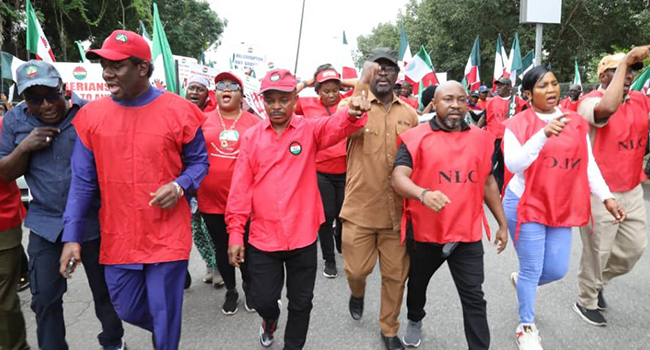NLC, TUC begin nation-wide strike… here are key issues to know

Credit: Channels
The Nigerian Labour Congress (NLC) and the Trade Union Congress (TUC) have begun their indefinite nationwide strike over the minimum wage and electricity tariff hike.
The Senate President, Godswill Akpabio, and Speaker of the House of Representatives, Tajudeen Abbas, held a last-minute meeting with Joe Ajaero and Festus Osifo, presidents of the NLC and TUC respectively, as well as other union leaders, but failed to stop the strike slated for June 3rd.
Nigerians across the country are experiencing a blackout as the labour union shut down the national electricity grid at 12:19 a.m. In a statement signed by the Transmission Company of Nigeria (TCN) GM, public affairs, Ndidi Mbah, it was stated that “the labour union has shut down the national grid, resulting in a blackout nationwide.”
Airports have been grounded due to the lack of electricity to facilitate activities, leaving many travelers stranded. Hospitals, ports, courts, schools, as well as other sectors of the economy, have been affected.
In a recent development, the Academic Staff Union of Universities joined the strike. In a statement signed on June 2nd by the president of the union, Emmanuel Osodeke, it read, “The NLC has begun an indefinite strike action starting from Monday, June 3rd, 2024, as a result of the failure of the government to conclude the renegotiation of the minimum wage for Nigerian workers and the reversal of the electricity tariff. Our branches are hereby enjoined to join in the strike action as an affiliate member of Congress.”
Students of the University of Lagos (UNILAG) have been in the dark and had lectures canceled, although this is not peculiar to the school alone.
More stories
“Let the poor breathe” — Surviving rising electricity tariffs in Nigeria
Here are the Key Issues to know
The labour union on April 14th, 2024, demanded that the current minimum wage be reviewed to reflect current economic realities, initially stating that the new minimum wage should be 615,000 naira.
The negotiation table had been opened with the FG offering 48,000, 57,000, and then 60,000. However, the NLC, which reviewed its demand, insisted on 494,000 naira as the livable income in the current economic situation of the country.
The current minimum wage of 30,000 naira was signed into law by former President Muhammadu Buhari on April 18, 2019. However, this income has been very insignificant as the cost of living in the country is very high. Food items, house rent, fuel, and electricity are no longer affordable.
Recall that on April 3rd, the Nigerian Electricity Regulatory Commission (NERC) announced that Band A consumers’ electricity tariffs would rise from 62 naira to 225 naira, before a minor reduction to 206.8 naira. This has also made living in the country unbearable.

